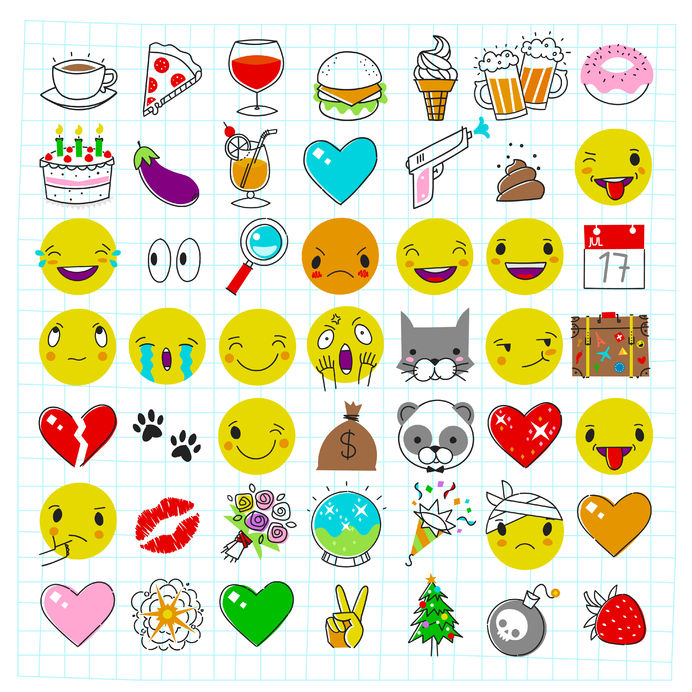Or: Can You Rhyme Emoji?
An eye rhyme is when two words that only look like they rhyme are used for a rhyme. This was an early annoyance from my childhood, when elementary poems rhymed good with food. Another famous one is from Shakespeare:
If this be error and upon me prov’d
I never writ, nor no man ever lov’d.
Both of those examples may be excused by having been real rhymes at one time (indeed, for the Bard, the o’s in both prov’d and lov’d were like the oo in good). Other eye rhymes have always been for your eyes only: come and home, for instance, which have never rhymed, or the name Sean Bean.

But if we can get away (at least occasionally) with rhyming things by appearance, then rhyme can be visual. In which case visual things can rhyme. Such as emoji.
Emoji could even expand the potential for visual rhymes, because they don’t always stand for a word sound per se. Sometimes they represent an attitude; if I write “I want to see you ?” it doesn’t mean “I want to see you smile.” Sometimes they give an accessory illustration, not for reading aloud: “Going to the Caribbean ?” isn’t really properly read as “Going to the Caribbean, palm tree” or even “Going to the Caribbean, where there are palm trees.” Sometimes emoji do stand in for a word or a phrase: “This one’s for all the ?? ? ❤” can be read as “This one’s for all the Canadian dog lovers.” But sometimes they stand in for something they just look a bit like – two well-known ones are ? for the buttocks and ? for the, uh, well, it’s, um, sexual.
All of this ought to open up the possibilities for emoji eye rhymes — or should I call them iRhymes? Consider these:
I thought I had it made ?
Not so sure anymore ?
Some batters are for pancakes ?
And some are for baseball ?
You said ?
I said ?
You said ?
I said ?
I said ?
You said ?
But are those really rhymes? They’re image-plays, yes. Visual puns, perhaps. But rhymes imply sound. If you feel that eye rhymes are a form of cheating (as I do), then iRhymes aren’t really rhymes at all. I’m confident that if there’s an option to use an actual word sound for the emoji, we’ll prefer it. You tell me which of the following two couplets rhymes:
I bought you a ?
We rode on a ?
I baked you a ?
You called me a ?
I think you’ll agree that ? and ? qualify as an iRhyme. But would anyone really call that a rhyme? And, on the other hand, ? looks nothing like ?, but for most English speakers it should be an obvious rhyme because of the words we’d say for them.
Besides, there’s another problem with emoji: They don’t look the same on all systems. There are a few that are strikingly different from system to system — the mood of ? changes dramatically, for instance, and the shape, orientation, quantity and type of ? differs enough to destroy any iRhyme.
Which, come to think of it, is sort of like how a difference in pronunciation — between two places or between Shakespeare’s time and now — can throw off a sound rhyme.
___
Previous “Linguistics, Frankly” post: The Roots of Disagreement.
The Editors’ Weekly is the official blog of Editors Canada. Contact us.
Discover more from The Editors' Weekly
Subscribe to get the latest posts sent to your email.
